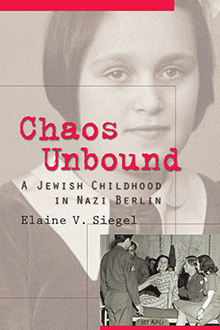Keynote Books announces …
Chaos Unbound: A Jewish Childhood in Nazi Berlin
Elaine V. Siegel
“We spied on our families, just like the Hitler Youth had exhorted us to do, but not to catch them in the midst of illicit or illegal acts. We had a different purpose: We wanted to keep our grown-ups alive and away from the police. This was not always easy.” — Elaine V. Siegel, from Chaos Unbound

In 1925, Charlotte Resca, a German-Jewish girl of 18 years, was so enamored of her handsome German-Protestant fiancé that she followed him to America. There they would would marry and begin a new life. The marriage failed, but not before a daughter, Elaine, was born on December 29, 1928. In the summer of 1931, Charlotte, unaware of the horror soon to unfold, left her husband and returned to Berlin with her two-and-a-half-year-old Jewish daughter. Beautiful and ambitious, she would pursue a career in banking while her child was raised by the grandparents. Young Elaine would bond with her remarkable maternal grandmother, a midwife, herbal healer, and counselor of local renown, and grow up with an odd assortment of friends, neighbors, and relations, Jewish and Gentile, wealthy and impoverished, pro- and anti-Nazi.
There is drama in this memoir of a Jewish childhood in Nazi Berlin. The tightening grip of anti-Semitism, the transformation of local ne’er-do-wells into imperious Brownshirts, the marginalization and degradation of shopkeepers and merchants who resisted Nazi blandishments, and the visceral disgust of many Germans for Hitler — all are woven into a story whose very intimacy captures the largeness of its historical moment. It is especially the young Elaine’s clarity of vision — her keen understanding of what was happening around her and what was required to safeguard herself and “her adults” — that pulls the reader along in this gripping account of Jewish survival in the eye of the Nazi storm.
“Elaine Siegel presents us with the fascinating story of her survival as a Jewish child in Nazi Berlin. Full of detail and laced with pungent observations of the adults around her, Siegel’s memoir recreates the child’s view of, and emotional reactions to, the Nazi coming to power with astuteness and clarity.” — Susannah Heschel, Eli Black Professor of Jewish Studies, Dartmouth College
Copyright permissions requests, translation rights requests, and queries regarding purchase of bulk quantities should be directed to info@keynote-books.com.
From Chaos Unbound
“We did not know exactly what ‘racial purity’ was, but we three knew we didn’t have it. For one thing, you had to be blond and tall and have long braids to wind around your head. Helga and I felt totally outclassed. She had brown hair whereas Pauli and I had even less fashionable black hair. He tried to have his dyed once but was caught at the barber’s by one of the Brownshirts who promptly took him to the party headquarters and gave him a good beating for his ‘unmanly behavior’.”
“The bunch of children who used to play amicably together now taunted one another unmercifully. Sometimes an unknown grown-up would stand and watch us. Others shook their heads and walked away. One openly cried and then gave us all candy.”
“Helga pointed out that my mother, with her fine dresses and good perfume and uppity male friend, was a less than ideal German mother. But what could one report about her, given that we weren’t even Nazis. That she used lipstick? And what exactly was so unpatriotic about lipstick?”
“I didn’t know whether I should confide in Grandmama how Helga and I felt about the Bum from Austria and allow myself to gloat at the momentary defeat of her two Nazi relatives. Or perhaps I should wait to talk to my mother to warn her about the Nazis who had infiltrated even the safe harbor of our new family. Or perhaps it would suffice simply to make sure that, here and now, in this strange new environment, she was still my mother.”
“When Jewish neighbors were ‘resettled,’ as Anna read to us from the papers, Helga, Pauli, and I tried not to cry because we had been taught in school that German youth must be stalwart and strong. We agreed, but wanted to use our stalwartness and strength to save our own families who, in our opinion, had not the slightest idea of the danger they were in. So how could one become grown up, stalwart, and strong in the shortest possible time?”